
Exposé Online
What's old
Exposé print issues (1993-2011)
- 1 (October 1993)
- 2 (February 1994)
- 3 (May 1994)
- 4 (August 1994)
- 5 (October 1994)
- 6 (March 1995)
- 7 (July 1995)
- 8 (November 1995)
- 9 (March 1996)
- 10 (August 1996)
- 11 (February 1997)
- 12 (May 1997)
- 13 (October 1997)
- 14 (February 1998)
- 15 (July 1998)
- 16 (January 1999)
- 17 (April 1999)
- 18 (November 1999)
- 19 (May 2000)
- 20 (October 2000)
- 21 (March 2001)
- 22 (July 2001)
- 23 (December 2001)
- 24 (April 2002)
- 25 (September 2002)
- 26 (February 2003)
- 27 (August 2003)
- 28 (December 2003)
- 29 (April 2004)
- 30 (September 2004)
- 31 (March 2005)
- 32 (September 2005)
- 33 (May 2006)
- 34 (March 2007)
- 35 (January 2008)
- 36 (October 2008)
- 37 (July 2009)
- 38 (July 2010)
- 39 (Summer 2011)
Features
From Caves to Concert Halls —
The Jerry Marotta Interview
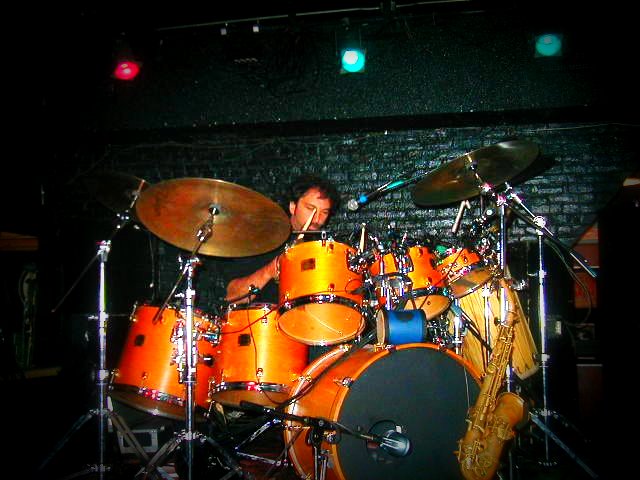
Like Tony Levin, Jerry Marotta has long been a sought-after studio musician. His muscular drumming, which gave life to Peter Gabriel's second through fourth albums, has performed the same magic for many other artists.
by Jon Davis, Published 2001-07-01
photography by Danette Davis
How was it you ended up being in Peter Gabriel's band?
I think it was Tony. He did the first solo record, and then I think the band that did the record was touring with him early on, and then the drummer – who was a session drummer from New York – he stopped doing it. A bunch of the guys stopped doing it, and Peter just put a different band together. And so Tony, who had known me and my brother (who's also a drummer), suggested either one of us, and my brother couldn't do it. That's how I started working with Peter.
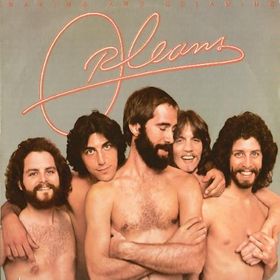 So you had worked with Tony before that?
So you had worked with Tony before that?
I don't know if I'd ever played with Tony before then. I was originally – this is a long time ago, like [when I was] about twenty years old – I was working with a group called Orleans. We had a couple hits back in the seventies, and then the band broke up, and about a month later I was just looking for a gig, and this came up. So I started doing it.
Certainly your style really fit in with what Peter Gabriel was doing, with very heavy playing on the toms.
That sort of developed from working with Peter more than what I was doing before. I think all of our styles developed around what Peter was doing- that was the beauty of that particular arrangement of people. Larry and myself and Tony were the core of that band with Peter for about ten years. Guitar players would come and go, and then settled in to David Rhodes. But we really developed a style together and a sound together.
Did it just sort of fall together, or did Peter say, "Could you do something a little more..."
It was a combination of things, just kind of the way we all developed, and then Peter. Certainly the kinds of songs he was writing, and what he wanted to have happen, helped the process a lot. I think it was the perfect kind of collaborative, where everybody was developing, and it caught everybody at the right time. We all sort of got into the same mode and then it took off from there.
What are some of the more interesting things you've done aside from that?
Interesting things. I worked with a group called Tears for Fears; I worked with Robbie Robertson from the Band – it's not progressive, but it's really good music. What else...
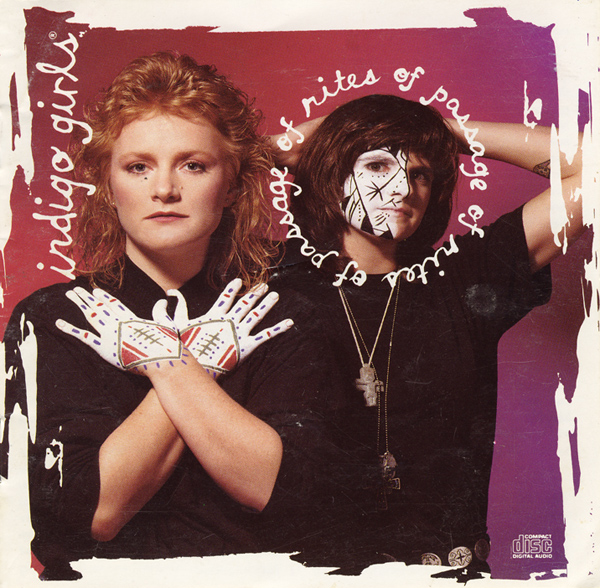 Indigo Girls.
Indigo Girls.
Working with the Indigo Girls for years; Jewel, Paul McCartney, I forget. Suzanne Vega – I've done a couple records with Suzanne, working with a producer named Mitchell Froom and Tchad Blake, an engineer. I've done a lot of work with them. A couple records with a guy named Ron Sexsmith, a Canadian artist who's very, very good.
I hadn't realized you were on the Suzanne Vega albums. I guess I should read the credits more closely.
Yeah, I did her last two records.
I've enjoyed what she's doing lately. Very interesting.
Yes, she's great.
I'm a big fan of the Indigo Girls, and you fit in really well with their music, though you wouldn't think Jerry Marotta would fit in with two women and acoustic guitars. But it does work.
Yeah, it just happened to work out. I sort of had been bred to do that, [to always] adjust my style, and I had to adjust my style as much as I did for Peter for the Indigo Girls. But some of the stuff like "Galileo" I guess was a good mixture of me doing the odd kind of beat that included toms and stuff, and then doing their thing, writing those kinds of songs that they write. I just worked with them about two weeks ago on a new retrospective record. We recorded a couple of new songs, I worked with them on that. I haven't been touring with them this year, but...
On their live album 1200 Curfews, you got a chance to play some other non-percussion instruments.
I've played saxophone with them, and lap steel, mandolin. It pretty much was an open palette there. I could do whatever I wanted, whenever I wanted.
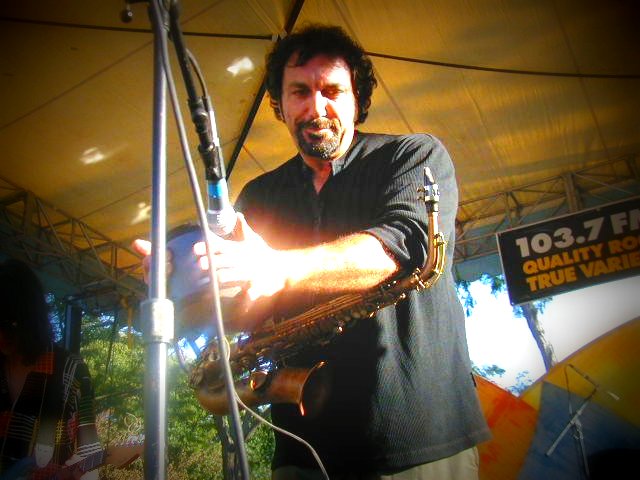 Had you played those instruments before?
Had you played those instruments before?
Yes, lap steel's a really great instrument, but I never got to play it with anybody, and I just started using it in certain spots with them.
I noticed in the sound check tonight that you're singing.
I've done a lot of singing. I worked with Daryl Hall and John Oates, and I sang third part with them. In Orleans I used to sing. It was really a vocal group, so I sang in that band. "Dance with Me" and "Still the One" made it big. They were very good musicians, but it wasn't a playing band - everybody sang. It was a very seventies kind of thing, big harmonies. So I've always liked singing. So we decided we might like to do "Back in New York City." We used to have fun doing that with Peter, and somebody had to do the singing. It's a dirty job, but somebody has to do it!
You sounded quite reasonable on it.
I still don't totally know the song yet, and I certainly can't sing it like Peter does. Well, I try to do a bit of that but still put myself into it. But I really enjoy doing the singing thing. I have done background vocals on records where I didn't play any drums, and just did backing vocals.
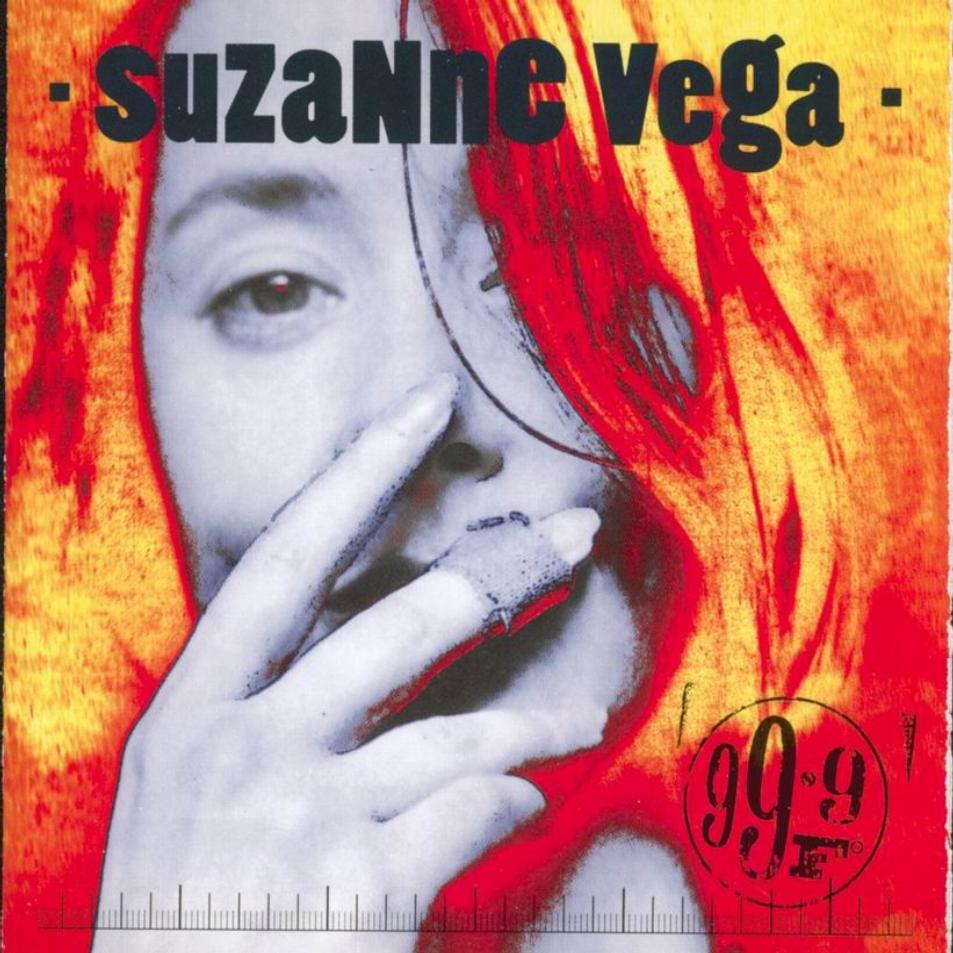 Taos drums seem to be showing up on a lot of things you've done. How did you start working with them?
Taos drums seem to be showing up on a lot of things you've done. How did you start working with them?
Working on the first Suzanne Vega record I did, which was 99.9 Degrees, the approach was to do everything... If you go back and listen to the record, there's not really a lot of "real" drums on it, we just wanted to put – Every day we'd come in early and Mitchell and Tchad and I would assemble a kit. For every song a new kit out of percussion instruments. And I borrowed a big Indian bass drum from a friend of mine who lived up in Woodstock, who's a musician. That was the first time I ever used it, and it just sounded amazing. We ended up using it on a lot of the record. It somehow found its way into most of the drum kits. And so when we were done, of course I had to return it. When I was on tour with the Indigos not long after that, we had a day off in Santa Fe, so I drove up to Taos and I went to the company and I bought a couple of drums, and became friendly [with them], and they got wind of the fact that a real musician was interested in playing them and using them. Because mostly people sell them as furniture in people's houses for a Southwest motif, so they started really being supportive. I'd go in there and they'd have drums picked out, they'd be looking for good sounding drums, because they knew for the most part [they are] interior decorations, not drums. They just have a fabulous tone, which is fun to me because, like you said, with the heavy tom thing. With Peter I was doing a lot of heavy hitting; with the Taos drums you can't really hit them. You can, but I end up playing with mallets and brushes, and hitting them a lot softer. But they speak really well, and they're just incredible drums, the tonality on them...
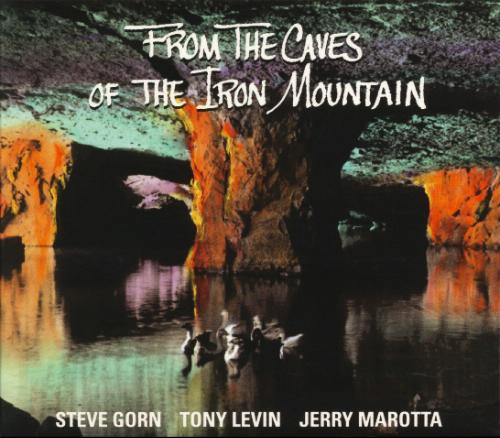 They have a resonance.
They have a resonance.
Yes, and certainly in the cave, they were perfect, because regular drums would have probably been too loud. But the Taos drums with soft mallets... Because we recorded the whole thing kind of live to two track. Tchad Blake recorded it binaurally, so there was no mixing or anything. We had to blend; he had to set the microphones on the Neuman head up in the right spot to blend the band. So they worked really well in that context.
I can't argue with that. It's a very interesting sound, the combination of the environment and what you did in it. Certainly working with Mitchell Froom has got to throw a lot of good jobs your way.
Oh yeah, everything to do with Mitchell is interesting.
He's one of my favorite producers.
He's great, and he's fantastic. He's a wonderful human being, and also extremely talented, he's got it all. And Tchad. He and Tchad are a good combination, though Tchad's been doing a lot of independent producing lately. I spoke to him the other day, and he's getting tired of it. He doesn't really like doing it, he prefers working with Mitchell, and I think they're going to start working together again. Tchad produced this new Pearl Jam record, and it's just disappointing nowadays. Big projects like that are really disappointing. You do a certain kind of record, and then the record company comes in and they remix it and redo stuff and it doesn't end up being what you planned on doing. It's frustrating.
The way Tony does it, you don't have to worry about that.
No, 'cause nobody cares about that. Not a lot of money involved.
So the fans get what the musicians really wanted.
Exactly.
Is there anything else coming up in the future?
I've got to really start working on my own material! And then hopefully we'll keep doing this [the Tony Levin Band], we'll all develop that thing that we developed with Peter, we can get into that zone again with one another, and develop that sound. We're scratching the surface now, but there's a long way to go. Still, we all get along so well, and we all like each other a lot. Tony and my styles really mesh together. He's been my favorite bass player, and I always think I sound better when I'm playing with Tony 'cause he's such a good musician. He's complementary to what I do.
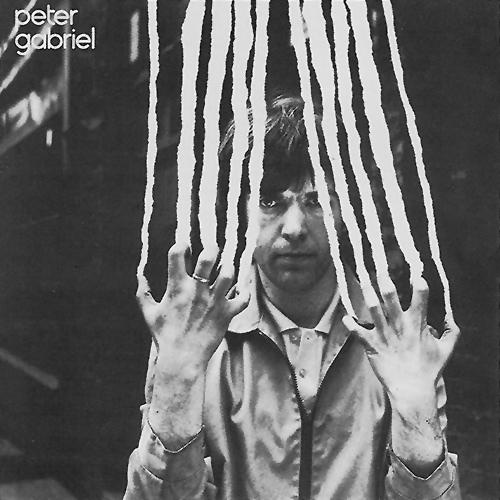 I've always liked your style putting that accent in the place you don't expect it.
I've always liked your style putting that accent in the place you don't expect it.
Thank you. I'm always developing, and it was very nice with Peter and with these guys. We really got a chance to do that. It's not that easy to find jobs where you're able to do that. Hopefully this will turn into... The potential we already knew from years ago with Gabriel, what the potential is... We won't have Peter any longer with us, but that's been opening up a whole other area.
This solo material that you're thinking of, what sort of stuff is that?
You know I play guitar and keyboards, and I end up writing instrumental stuff. Some vocal stuff. I produce, I've been doing production work. All I've got to do is just take some time now and develop some of my own music, which I've put off for a long time. It's so easy working with other people. Tony's been sort of inspiring to me, with [calling to Tony] – what have you got, a thousand different records out?
Larry Fast: It's only eight hundred.
There's a thousand, but he's got the rights to eight hundred of them! Tony's behind, I'm way behind. He's got a couple of records out, I've got nothing. By January I should have the material.
Filed under: Interviews, Issue 22
Related artist(s): Jerry Marotta
More info
http://www.jerrymarotta.com
What's new
These are the most recent changes made to artists, releases, and articles.
- Review: LeoNero - Monitor
Published 2026-03-04 - Review: Sterbus - Black and Gold
Published 2026-03-03 - Release: Janel Leppin's Ensemble Volcanic Ash - Pluto in Aquarius
Updated 2026-03-02 15:06:51 - Release: Janel Leppin - Slowly Melting
Updated 2026-03-02 15:05:27 - Release: Alister Spence - Always Ever
Updated 2026-03-02 15:04:11 - Release: Let Spin - I Am Alien
Updated 2026-03-02 15:02:41 - Review: Falter Bramnk - Vinyland Odyssee
Published 2026-03-02 - Review: Exit - Dove Va la Tua Strada?
Published 2026-03-01 - Review: Steve Tibbetts - Close
Published 2026-02-28 - Release: We Stood Like Kings - Pinocchio
Updated 2026-02-27 19:24:02 - Release: Stephen Grew - Pianoply
Updated 2026-02-27 19:20:11 - Release: Thierry Zaboitzeff - Artefacts
Updated 2026-02-27 00:16:46 - Review: Kevin Kastning - Codex I & Codex II
Published 2026-02-27 - Release: Zan Zone - The Rock Is Still Rollin'
Updated 2026-02-26 23:26:09 - Release: The Leemoo Gang - A Family Business
Updated 2026-02-26 23:07:29 - Release: Ciolkowska - Bomba Nastoyashchego
Updated 2026-02-26 13:08:55 - Review: Immensity Crumb - Chamber Music for Sleeping Giants
Published 2026-02-26 - Release: The Gatekeepers - Diary of a Teenage Prophet
Updated 2026-02-25 15:55:58 - Review: Mars Lasar - Grand Canyon
Published 2026-02-25
